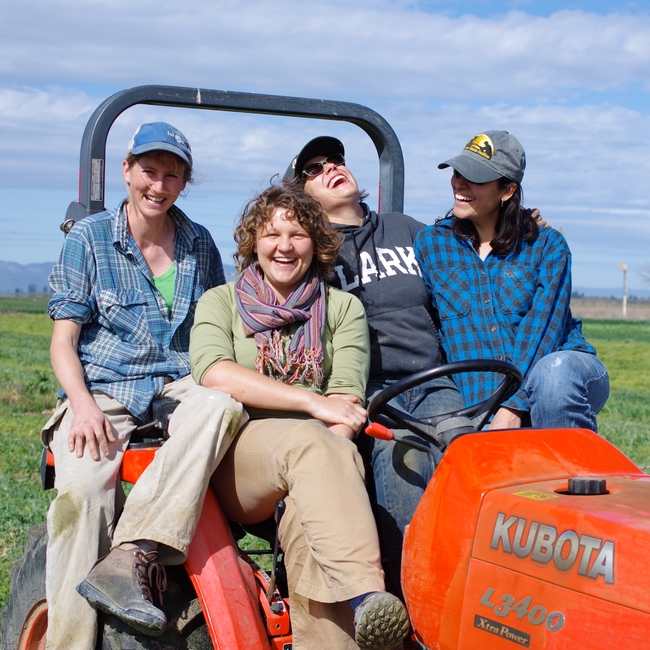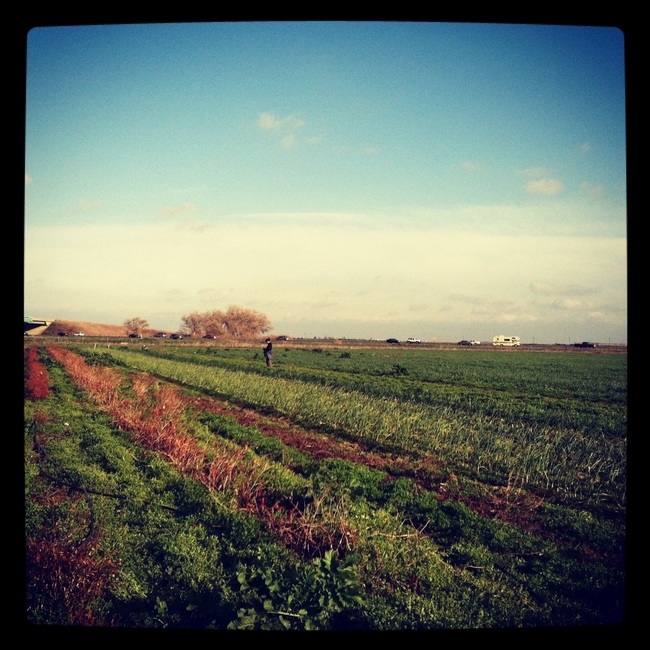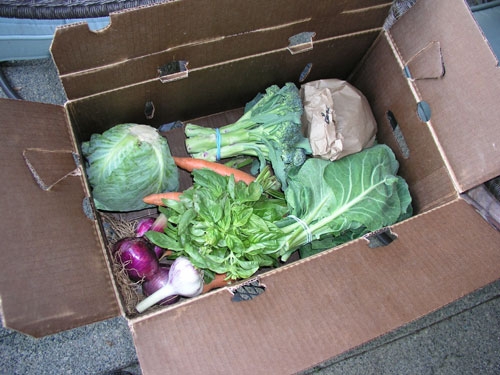
Posts Tagged: community supported agriculture
The promise of peaches
Tomatoes grow fine in my Sacramento backyard. I can usually count on plenty of basil, more zucchini than the neighbors will take, some snow peas, chard and kale, a few small peppers and eggplants and whatever salad greens survive the slugs (in other words, lots of arugula). We have oranges and grapefruit, but I wouldn't even try to grow peaches or apricots. It takes a farmer to grow peaches. It takes a good farmer to grow good peaches. It takes a good farmer and good weather to grow Blenheim apricots.
Instead of planting a peach tree, I joined a fruit community supported agriculture (CSA) program, promising to pay $15 a week for a box of fresh fruit every week from June 7 until October 4. By joining I am agreeing to share the risk and the promise of the harvest of a four-acre fruit orchard with four part-time beginning farmers growing fruits and vegetables just west of Davis.

The Cloverleaf at Bridgeway Farms offers a chance that is, Aubrey White says, "both attractive and terrifying, with everyone trying to make it happen while keeping their jobs." The monetary investments were low, as they have no buildings or heavy equipment, and Collins offered a very attractive lease arrangement to encourage the new farmers. The vegetable land is certified organic and the orchard land is in transition to organic. The part that is terrifying is the risk of crop failure and poor yields that all farmers face.
The Cloverleaf farmers all have some farming experience, but the orchard presented new challenges. White started with the UC Master Gardener Program in Los Angeles, worked with urban farms and community gardens, and for two years at the UC Davis Student Farm. But, she says, taking on the orchard involved a "crazy different learning curve for three out of four of us." Even with all of her agricultural experience, she felt at a disadvantage not having a science background, particularly not having the soil science information to best manage the orchard.
Luckily, the new farmers found a mentor. Organic farmer Carl Rosato, owner of Woodleaf Farm near Oroville, is the soil scientist peach farmer that every beginning orchard manager would love to know. Rosato has taken on advising the Cloverleaf farmers as they learn to confront peach leaf curl and blossom rot by keeping the soil healthy and pruning the trees to ensure good air ventilation. Knowing that Rosato is involved gives me hope that we'll see some Blenheim apricots in the CSA box this June.The original point of CSA programs was for the community (eaters) to share the risk of farming with the farmers, and to pay for a season's worth of produce up front to ease the cash-flow burden on the farmer before the harvest. In a pure traditional CSA, the farmer estimates the production for the year and sells shares in that production to as many families as the farm can be expected to feed. Each family receives a box of produce every week, with the full week's harvest divided up among the boxes. Some weeks there would be more variety than others; bounty and low yield would all be shared. Some years there would be good harvests and some years, poor harvests. The farmers are not at the mercy of the market, either wholesale buyers or competitive farmers' markets.
Most California CSA operators do not follow this traditional model, but sell to wholesale customers, restaurants, farmers markets and food processors in addition to the CSA customers. This means, in practice, that CSA customers do not share the full risk of the farm production and can expect a more consistent quantity in their box or basket each week. However, CSAs are an important and valuable part of most CSA operators' marketing plan. A UC study of several California organic farms selling through different marketing channels showed that the CSAs consistently returned the most profit to the marketing investment.
As a small farm with a young orchard, The Cloverleaf's fruit CSA still involves a little risk to the members. If the rain continues through June, as it did last year, we may not get those delicious Blenheims. Last year everyone lost them. But CSA manager White promises to give first priority to the CSA customers, with 25 to 50 percent of the fruit harvest going to CSA members. If needed, Cloverleaf will buy more blackberries from Collins or fill the boxes with the more successful varieties of peaches and nectarines.
In addition to the CSA, The Cloverleaf farmers will operate a farm stand, several U-pick days and a harvest festival this year, and sell fruit to several wholesale buyers. Just in case they don't have enough to do, they are considering introducing pastured chickens to the farm next year. The farm stand will open on Memorial Day at the Kidwell Road exit off Highway 80 between Davis and Dixon, and will remain open on Saturdays and Sundays until October. Information about the U-pick days and the harvest festival (and lots of other on-farm activities throughout California) will be listed on the UC Agritourism Directory, www.calagtour.org.
There might be a few shares left for the fruit CSA. For more information, visit the website or Facebook page of The Cloverleaf at Bridgeway Farms or email thecloverleaffarm@gmail.com. I'm looking forward to those peaches!

Community supported agriculture prospering in Central Valley

Membership in the CSAs surveyed for the study increased from an estimated 672 in 1990 to 32,938 in 2010.
The growth in Central Valley CSAs is one part of a bigger movement toward stronger direct relationships between farmers and consumers, said Ryan Galt, UC Davis assistant professor in the Department of Human and Community Development and co-author of the study “Community Supported Agriculture is thriving in the Central Valley."
“Consumers increasingly want to connect with the farmers who grow their food,” Galt explained, while unpacking a cornucopia of vegetables from his own CSA box. “Food is an intimate thing, so I don’t think it’s strange that people want to establish relationships with those who produce it.”
While Galt’s study focuses on the farm, rather than consumer, side of the relationship, he said he joined a CSA for several reasons.
“I wanted to support a more ecologically oriented agriculture, and the livelihoods of farmers and farmworkers. And then, there is the benefit of not having to shop as much,” he added, snipping a bunch of deep purple beets from their greens.
It’s beet season in California. The dark root vegetable is relatively new to Galt’s culinary repertoire. Had it not shown up in the first CSA box to which he subscribed, years ago, he might never have learned to prepare it and would unlikely order it on a menu. The surprise and challenge of preparing new, interesting foods is among the reasons Galt still subscribes to a CSA.
Like most California CSA members, Galt picks up a basket of produce from a central location, not necessarily the farm itself. Some CSA farms deliver directly to homes. Few require members to visit the farm, but most host member events.
“CSA farmers provide their members more than food. They offer a direct connection to what is happening on the farm and with the seasons, they educate their members on agricultural and rural issues, and they share recipes that help members use their food,” Galt said, sliding a pot of beets into the oven.
It’s a lucrative exchange for CSA farmers, he adds. Average gross sales per acre for CSA farms is six times greater than average CA farms. Because people subscribe to their farm in the same way people subscribe to magazines, CSA farmers have a good idea how much to produce and harvest, and, most importantly for them, they have a promised market and up-front cash. Many young farmers are creating CSAs because of these benefits.
“CSA farmers are motivated by their love of farming and the satisfaction of providing fresh produce to grateful members,” Galt said.
Roasted beets
6 medium beets
2 tablespoons balsamic vinegar
2 teaspoons orange zest
Pepper
Preheat oven to 350 F. Wash the beets and put the unpeeled in a roasting pan with about an inch of water. Cover and bake for an hour, or until they are easily pierced with a folk. Slip off the skins after the beets have cooled. Slice the beets into wedges. Toss with vinegar, orange zest and pepper. Serve at room temperature.


